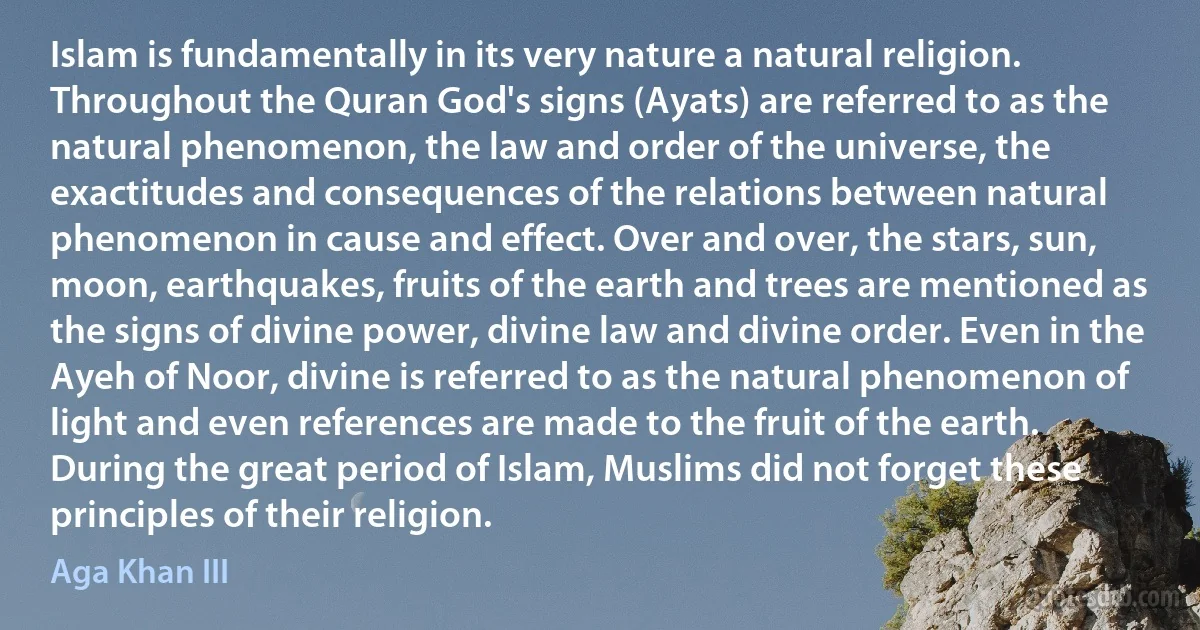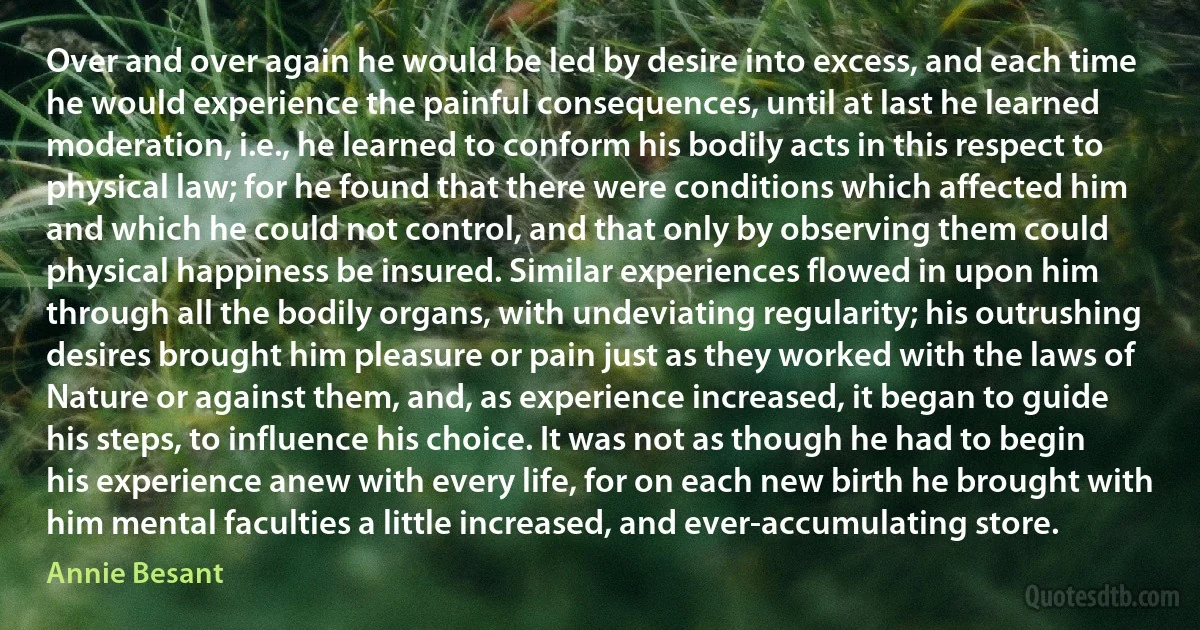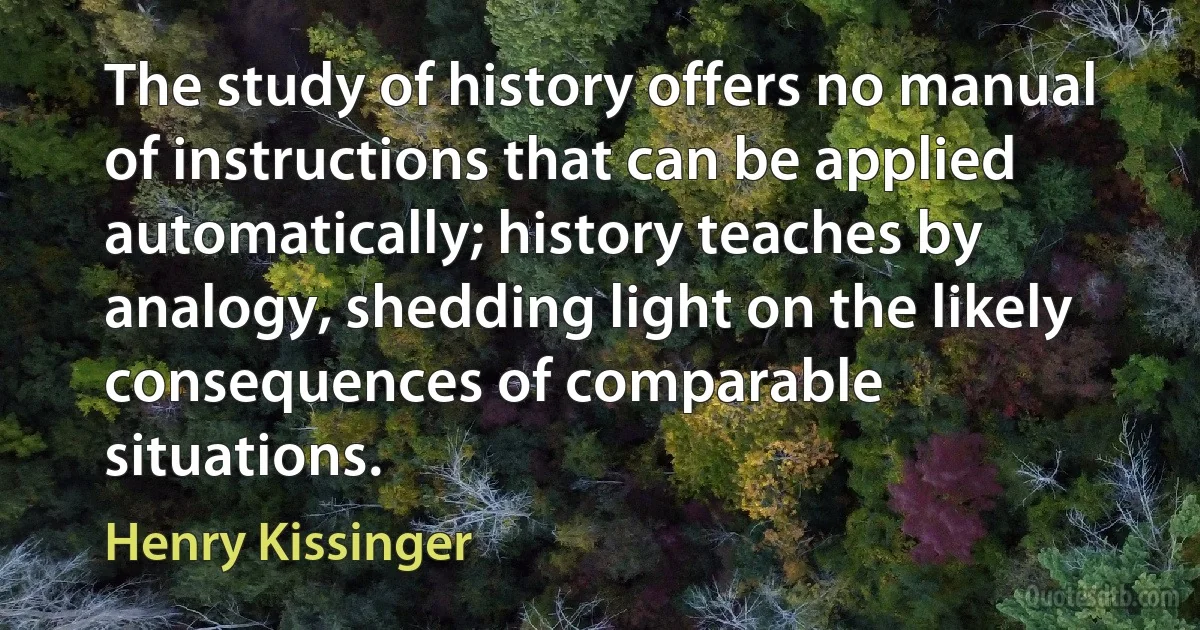Consequences Quotes - page 49
People are born; leaders are made. I was born the son of a leader with a clear path to a profession of leadership. But whatever leadership I later possessed, I learned from others. I grew up in a household of overt values, many of which hardened in me only as I matured. Although history fascinated me, and mentors surrounded me, the overall direction and key decisions of my life and career were rarely impacted by specific advice, or even a particularly relevant example I'd read or seen. I rarely wondered What would Nelson, Buford, Grant, or my father have done? But as I grew, I was increasingly aware of the guideposts and guardrails that leaders had set for me, often through their examples. The question became What kind of leader have I decided to be? Over time, decisions came easily against that standard, even when the consequences were grave.

Stanley A. McChrystal
The incorporation of every indidual in a collective mechanism of production, would mean the renunciation (or surrender) for man himself of its independence and his dignity as a rational (or thinking, or reasonable) being. The results (or consequences) of such a state of things would be: regression (or retrogression) and deterioration in every fields (or domain) of life. For the true progress consist in the accomplishment of higher ends, et these would be directly (or right off) made impossible in a coercive social mechanism. Let us think to the fate that, in these conditions, new truths would have in store ("Qu'on songe au sort qui, dans ces conditions, serait réservé à des vérités nouvelles", Fr.)

African Spir
Natural selection is an extremely simple process, in the sense that very little machinery needs to be set up in order for it to work. Of course the effects and consequences of natural selection are complex in the extreme. But in order to set natural selection going on a real planet, all that is required is the existence of inherited information.

Richard Dawkins
I support a great deal of what the President has done. I have voted with him 80% of the time. But my promise before God to apply impartial justice required that I put my personal feelings and biases aside. Were I to ignore the evidence that has been presented, and disregard what I believe my oath and the Constitution demands of me for the sake of a partisan end, it would, I fear, expose my character to history's rebuke and the censure of my own conscience.
I am aware that there are people in my party and in my state who will strenuously disapprove of my decision, and in some quarters, I will be vehemently denounced. I am sure to hear abuse from the President and his supporters. Does anyone seriously believe I would consent to these consequences other than from an inescapable conviction that my oath before God demanded it of me?

Mitt Romney
Professor Henry Holzer of the Brooklyn Law School believes that together the Belle Terre (1974) and Moore (1971) decisions stand for the proposition that it is a collectivist-statist ideology, not a concept of individual rights, that lies at the base of official government thinking about the family. Further, when the Court reviews state definitions of, or intrusions into, the family, "the determinative criterion will be the importance of the state interest involved." Riga concludes that in 15 years of Supreme Court cases ending in 1979, the view of marriage as an indissoluble lifelong commitment had been abandoned. In its wake is the perverted notion of liberty that each individual should be able to live out his sexual life in any way he chooses without interference from the state. The consequences of such thinking have been previously discussed, and ironically create the very problems that society now calls on the federal government to solve.

Bob McDonnell
In the victim's case the natural hour of death was anticipated accidentally, while in that of the suicide death is brought on voluntarily and with a full and deliberate knowledge of its immediate consequences. Thus a man who causes his death in a fit of temporary insanity is not a felo de se, to the great grief and often trouble of the Life Insurance Companies. Nor is he left a prey to the temptations of the Kāmaloka, but falls asleep like any other victim... The population of Kāmaloka is thus recruited with a peculiarly dangerous element by all the acts of violence, legal and illegal, which wrench the physical body from the soul and send the latter into Kāmaloka clad in the desire body, throbbing with pulses of hatred, passion, emotion, palpitating with longings for revenge, with un-satiated lusts.

Annie Besant
It goes without saying that a bird's death is inevitable, but a cat killing a bird does not have to juggle the same sort of values with which a man must be concerned. For now, suffice it to say that to kill for self-protection or food on your plane does not involve you in what we may call for the first time, I believe, karmic consequences. To kill for convenience . . . or for the sake of killing involves rather dire consequences, and the emotional value behind such killing is often as important as what is killed. That is, the lust [for] killing is also a matter that brings consequences, regardless of the living thing that is killed.

Robert Butts
There is a law higher than men can make. The facts as they exist in this poor world -- the absolute consequences of certain acts -- they are above all. And this higher law is the breath of progress, the very outstretched wings of civilization, under which we enjoy the freedom we have. Keep that in your minds. There never was a legislature great enough -- there never was a constitution sacred enough, to compel a civilized man to stand between a black man and his liberty. There never was a constitution great enough to make me stand between any human being and his right to express his honest thoughts. Such a constitution is an insult to the human soul, and I would care no more for it than I would for the growl of a wild beast.

Robert G. Ingersoll
Soul of my soul ... Now I am going alone. I grieve for your helplessness. But what is the use? Every torment I have inflicted, every sin I have committed, every wrong I have done, I carry the consequences with me. Strange that I came with nothing into the world, and now go away with this stupendous caravan of sin! ... Wherever I look I see only God. ... I have greatly sinned, and I know not what torment awaits me. ... Let not Muslims be slain and the reproach fall upon my useless head. I commit you and your sons to God's care, and bid you farewell. I am sorely troubled. Your sick mother, Udaipuri, would fain die with me. ... Peace!

Aurangzeb
It is a human inclination to hope things will work out, despite evidence or doubt to the contrary. A successful manager must resist this temptation. This is particularly hard if one has invested much time and energy on a project and thus has come to feel possessive about it. Although it is not easy to admit what a person once thought correct now appears to be wrong, one must discipline himself to face the facts objectively and make the necessary changes - regardless of the consequences to himself. The man in charge must personally set the example in this respect. He must be able, in effect, to "kill his own child" if necessary and must require his subordinates to do likewise.

Hyman G. Rickover
Where is the pop culture that makes riding public transportation and eating a plant-based diet fun, cool, and accessible to diverse audiences? Imagine the power of being exposed to an abundance of stories, songs, and images that challenge our fundamental consumption culture and expand our perspectives by helping us feel the consequences of our choices. What if we made it uncool to use fossil fuels in the same way smoking became uncool?

Favianna Rodriguez
Never has a Nobelprize-winner been in the outward sense so absent at a Nobel festival as Professor Hahn. And I suppose, too, that no Nobelprize-winner has ever, through the consequences of his discoveries, been so intensely present to our consciousness. Alfred Nobel hoped that in dynamite he had discovered such a powerful explosive that future wars would be impossible. The hope was not fulfilled; but dynamite is used today mostly for peaceful purposes. May we venture to hope the same of atomic energy? Hahn's discovery of the cleavage of atoms is the crowning feat, so far, in a series of discoveries for which Nobelprizes have been awarded. We acclaim today this celebrated researcher's scientific achievements.

Otto Hahn
Temperament refers to the mode of reaction and is constitutional and not changeable; character is essentially formed by a person's experiences, especially of those in early life, and changeable, to some extent, by insights and new kinds of experiences. If a person has a choleric temperament, for instance, his mode of reaction is "quick and strong.” But what he is quick or strong about depends on his kind of relatedness, his character. If he is a productive, just, loving person he will react quickly and strongly when he loves, when he is enraged by injustice, and when he is impressed by a new idea. If he is a destructive or sadistic character, he will be quick and strong in his destructiveness or in his cruelty. The confusion between temperament and character has had serious consequences for ethical theory. Preferences with regard to differences in temperament are mere matters of subjective taste. But differences in character are ethically of the most fundamental importance.

Erich Fromm
There are ideal series of events which run parallel with the real ones. They rarely coincide. Men and circumstances generally modify the ideal train of events, so that it seems imperfect, and its consequences are equally imperfect. Thus with the Reformation; instead of Protestantism came Lutheranism.

Novalis
The Court has done what it has never done before: expressly take away a constitutional right that is so fundamental to so many Americans that had already been recognized.The Court's decision to do so will have real and immediate consequences. State laws banning abortion are automatically taking effect today, jeopardizing the health of millions of women, some without exceptions.

Joe Biden
After many years of working with and listening to American adolescents, I don't believe they are ready for sex or its potential consequences – parenthood, abortion, sexually transmitted diseases – and I think we need to do everything in our power to discourage sexual activity and encourage abstinence.

Hillary Clinton
To imitate the ostrich in political matters has never been a satisfactory method of avoiding danger; yet this is what Hitler, as well as his more important political, economic and even military advisers, chose to do over and over again. The consequences of this deliberate blindness in the face of hard facts were devastating; and it was we who now had to bear them.

Heinz Guderian
Ratnakar, the bandit, became the poet Valmiki. Once when he tried to rob a sage, of his meagre belongings, he was told that no one else but he would suffer the consequences of his misdeeds. Repentant and reformed, he asked the sage for the way out of sin. He was told to recite Mara, mar (reverse of Rama). The bandit sat in penance and recited the mantra and forgot the world. An anthill enveloped him. When he was dug out, he was a realised soul and called Valmiki (one who came out of Valmike - Sanskrit for anthill). The urge to write Ramayana was triggered by Valmiki's sensitive reaction to the wailing of a bird, whose mate was killed by a hunter. The ideal society portrayed so realistically in the Ramayana by Valmiki made Gandhiji name the Utopia he envisaged for India: Rama Rajya!

Valmiki
As an active privilege, [free speech] ranks with the privilege of committing murder: we may exercise it if we are willing to take the consequences. Murder is forbidden both in form and in fact; free speech is granted in form but forbidden in fact. By the common estimate both are crimes, and are held in deep odium by all civilized peoples. Murder is sometimes punished, free speech always.

Mark Twain



